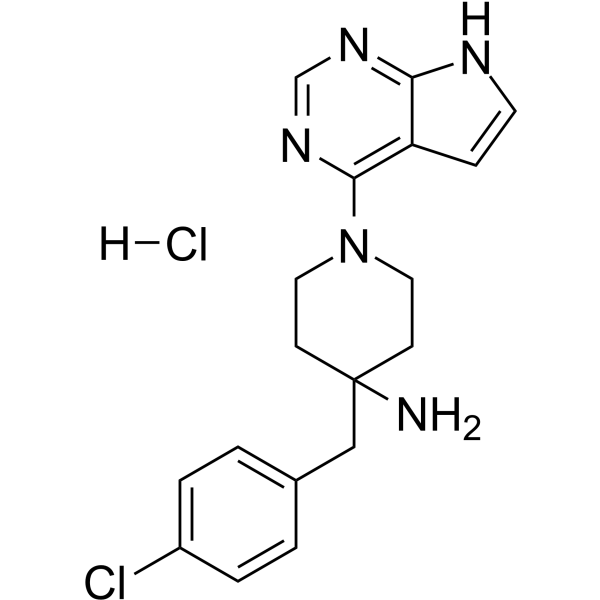
CCT128930 hydrochloride
CAS No. 2453324-32-6
CCT128930 hydrochloride( CCT128930 hydrochloride(885499-61-6 Free base) )
Catalog No. M28555 CAS No. 2453324-32-6
CCT128930 hydrochloride is a potent and selective inhibitor of AKT with IC50 of 6 nM. CCT128930 hydrochloride induces cell cycle arrest, DNA damage, and autophagy.
Purity : >98% (HPLC)
 COA
COA
 Datasheet
Datasheet
 HNMR
HNMR
 HPLC
HPLC
 MSDS
MSDS
 Handing Instructions
Handing Instructions
| Size | Price / USD | Stock | Quantity |
| 2MG | 69 | Get Quote |


|
| 5MG | 106 | Get Quote |


|
| 10MG | 177 | Get Quote |


|
| 25MG | 356 | Get Quote |


|
| 50MG | 533 | Get Quote |


|
| 100MG | 761 | Get Quote |


|
| 200MG | Get Quote | Get Quote |


|
| 500MG | Get Quote | Get Quote |


|
| 1G | Get Quote | Get Quote |


|
Biological Information
-
Product NameCCT128930 hydrochloride
-
NoteResearch use only, not for human use.
-
Brief DescriptionCCT128930 hydrochloride is a potent and selective inhibitor of AKT with IC50 of 6 nM. CCT128930 hydrochloride induces cell cycle arrest, DNA damage, and autophagy.
-
DescriptionCCT128930 hydrochloride is a potent and selective inhibitor of AKT with IC50 of 6 nM. CCT128930 hydrochloride induces cell cycle arrest, DNA damage, and autophagy. CCT128930 hydrochloride has 28-fold selectivity over the closely related PKA kinase (IC50: 168 nM) through the targeting of Met282 of AKT, as well as 20-fold selectivity over p70S6K (IC50: 120 nM).(In Vitro):In U87MG human glioblastoma cells, CCT128930 hydrochloride(0.1-60 μM; 1 hour) shows an initial induction of AKT phosphorylation at serine 473 up to 20 μM, followed by a decreased in phosphorylation at higher concentrations. CCT128930 (18.9 μM) hydrochloride causes an increase in phosphorylation of pSer473 AKT after 30 minutes, which is sustained for 48 hours. Total AKT protein signal decreases gradually from 8 hours to 48 hours of treatment. The GI50 values of CCT128930 hydrochloride for growth inhibition are 6.3 μM for U87MG human glioblastoma cells, 0.35 μM for LNCaP human prostate cancer cells, and 1.9 μM for PC3 human prostate cancer cells, all of which are PTEN-deficient human tumor cell lines. CCT128930 hydrochloride inhibits direct substrates of AKT (Ser9 GSK3β, pThr246 PRAS40 and pT24 FOXO1/p32 FOXO3a) at ≥5 μM, and the downstream target, pSer235/236 S6RP at ≥10 μM, with generally constant levels of the respective total proteins and GAPDH.(In Vivo):CCT128930 hydrochloride shows antitumor activities in U87MG and BT474 human breast cancer xenografts.
-
In VitroThe GI50 values of CCT128930 hydrochloride for growth inhibition are 6.3 μM for U87MG human glioblastoma cells, 0.35 μM for LNCaP human prostate cancer cells, and 1.9 μM for PC3 human prostate cancer cells, all of which are PTEN-deficient human tumor cell lines.CCT128930 (0.1-60 μM; 1 hour; U87MG human glioblastoma cells) hydrochloride shows an initial induction of AKT phosphorylation at serine 473 up to 20 μM, followed by a decreased in phosphorylation at higher concentrations.CCT128930 hydrochloride inhibits direct substrates of AKT (Ser9 GSK3β, pThr246 PRAS40 and pT24 FOXO1/p32 FOXO3a) at ≥5 μM, and the downstream target, pSer235/236 S6RP at ≥10 μM, with generally constant levels of the respective total proteins and GAPDH.CCT128930 (18.9 μM; U87MG human glioblastoma cells) hydrochloride causes an increase in phosphorylation of pSer473 AKT after 30 minutes, which is sustained for 48 hours. Total AKT protein signal decreases gradually from 8 hours to 48 hours of treatment.CCT128930 (PTEN-null U87MG human glioblastoma cells; over a 24-hour time period) hydrochloride results in an increase in G0/G1 phase cells from 43.6% to 64.8% after 24 hours of treatment.CCT128930 (0-10 μM; 24 hours) hydrochloride increases, but not inhibites, the phosphorylation of Akt in HepG2 and A549 cells. CCT128930 (0-20 μM; 24 hours) hydrochloride inhibits cell proliferation by inducing cell cycle arrest in G1 phase through downregulation of cyclinD1 and Cdc25A, and upregulation of p21, p27 and p53. CCT128930 (20 μM) hydrochloride triggers cell apoptosis with activation of caspase-3, caspase-9, and PARP. CCT128930 (0-20 μM; 24 hours) hydrochloride increases phosphorylation of ERK and JNK in HepG2 cells. CCT128930 (0-20 μM; 24 hours) hydrochloride activates DNA damage response of HepG2 cell characterized by phosphorylation of H2AX, ATM (ataxia-telangiectasia mutated), Chk1 and Chk2.
-
In VivoCCT128930 (25 or 40 mg/kg; i.p. daily or twice daily for 5 days) hydrochloride shows antitumor activities in U87MG and BT474 human breast cancer xenografts.Summary of the pharmacokinetic parameters of CCT128930 (25 mg/kg) in CrTacNCr-Fox1nu mice.Apparent clearance. Animal Model:6-8 weeks old female CrTacNCr-Fox1nu mice Dosage:25 mg/kg (U87MG human glioblastoma xenografts) or 40 mg/kg (BT474 human breast cancer xenografts) Administration:i.p. daily for 5 days (U87MG human glioblastoma xenografts); i.p. twice daily for 5 days (BT474 human breast cancer xenografts)Result:Giving a treated:control (T/C) ratio on day 12 of 48%. There was no weight loss associated with this regime in U87MG human glioblastoma xenografts.
-
SynonymsCCT128930 hydrochloride(885499-61-6 Free base)
-
PathwayApoptosis
-
TargetApoptosis
-
RecptorAMPAR
-
Research Area——
-
Indication——
Chemical Information
-
CAS Number2453324-32-6
-
Formula Weight378.3
-
Molecular FormulaC18H21Cl2N5
-
Purity>98% (HPLC)
-
SolubilityIn Vitro:?DMSO : 20 mg/mL (52.87 mM)
-
SMILESCl.NC1(Cc2ccc(Cl)cc2)CCN(CC1)c1ncnc2[nH]ccc12
-
Chemical Name——
Shipping & Storage Information
-
Storage(-20℃)
-
ShippingWith Ice Pack
-
Stability≥ 2 years
Reference
1.Zmijewski M, et al. Application of biocatalysis to drug metabolism: preparation of mammalian metabolites of a biaryl-bis-sulfonamide AMPA (alpha-amino-3-hydroxy-5-methylisoxazole-4-propionic acid) receptor potentiator using Actinoplanes missouriensis. Drug Metab Dispos. 2006 Jun;34(6):925-31.
molnova catalog



related products
-
Pipobroman
Pipobroman is an anti-cancer drug that probably acts as an alkylating agent.
-
D609
D609 (Tricyclodecan-9-yl-Xanthogenate) has a wide range of biological activities including antioxidant, antiapoptotic, anticholinergic, antitumor, anti-inflammatory, antiviral, antiproliferative, and neuroprotective activities.
-
(Rac)-Idroxioleic ac...
Minerval is a fatty acid amide hydrolase inhibitor with anti-tumor effect.



 Cart
Cart
 sales@molnova.com
sales@molnova.com


